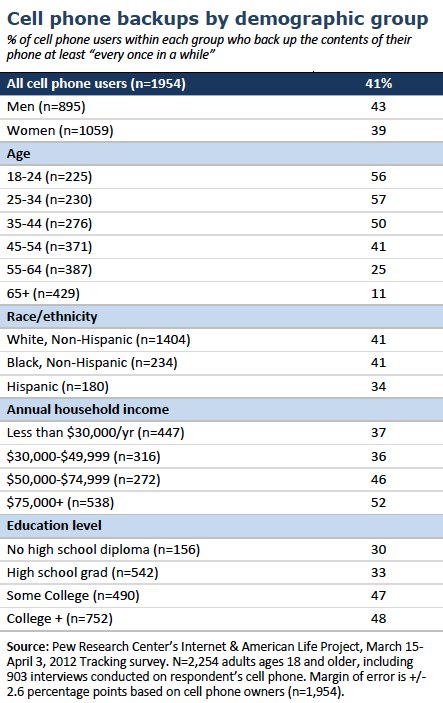Apps and privacy: More than half of app users have uninstalled or decided to not install an app due to concerns about their personal information
In this survey, we found that 88% of American adults use cell phones. Some 43% of these cell owners now download apps to their phones, which is a notable increase from the 31% of cell owners who said they downloaded apps in 2011. As mobile applications grow in popularity, a substantial share of consumers is taking into consideration the way apps deal with users’ personal information:
- 54% of app users have decided to not install a cell phone app once they discovered how much personal information they would need to share in order to use it
- 30% of app users have uninstalled an app that was already on their cell phone because they learned it was collecting personal information that they didn’t wish to share
Taken together, 57% of all app users have either uninstalled an app over concerns about having to share their personal information, or declined to install an app in the first place for similar reasons.
Interestingly, there are relatively few differences—demographic or otherwise—between app users when it comes to avoiding or uninstalling apps due to concerns about data collection or sharing. Certainly, some groups are more likely than others to use apps in the first place (these differences are illustrated in the table below), but significant differences among those who actually use apps are largely confined to the following:
- Male app users are more likely than female app users to say they have uninstalled an app because it was sharing too much of their personal information. Men and women are equally likely to avoid apps entirely based on personal privacy concerns.
- Apps users with at least some college experience are somewhat more likely than those with a high school education to choose not to install an app over privacy concerns. There are no educational differences when it comes to deleting existing apps for this reason.
Outside of these rather modest differences, the story of cell owners’ concerns about apps and their personal information is one of consistency across groups. Younger cell owners are much more likely than their elders to use apps—yet app users of all ages are equally likely to remove (or to avoid downloading) an app based on privacy concerns.
In addition, iPhone and Android owners take nearly identical steps when it comes to sharing personal information in the context of apps. Among app users, 54% of iPhone owners and 56% of Android owners have avoided an app due to concerns about access to their personal information, while 28% of iPhone owners and 32% of Android owners have uninstalled an app for that reason. In each case, these modest differences are not statistically significant.
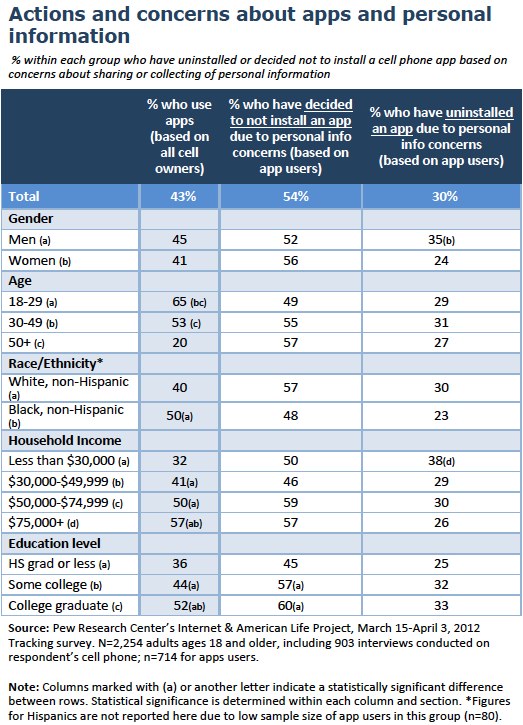
One in five cell owners have turned off the location tracking feature on their phone, and one in three have cleared their cell phone browsing or search history
Although they pose unique challenges to consumers from the standpoint of protecting one’s personal information, apps represent just one component of the mobile privacy environment. Mobile devices store a wide array of personal (and potentially sensitive) data, from detailed search and browsing histories to up-to-the-minute information about one’s location or movements.
In an effort to measure consumers’ responses to these broader privacy concerns, we asked cell owners about their experiences with two specific behaviors—clearing one’s search or browsing history, and disabling the general location tracking feature on one’s phone. We found that:
- 32% of all cell owners have cleared the browsing history or search history on their phone
- 19% of all cell owners have turned off the location tracking feature on their cell phone because they were concerned that other individuals or companies could access that information
Smartphone owners are especially active when it comes to these behaviors. Some 50% of smartphone owners have cleared their phone’s browsing or search history, while 30% have turned off the location tracking feature on their phone due to concerns over who might access that information.
Age is also correlated with this aspect of mobile privacy management. Some 44% of cell owners ages 18-24 have cleared the search or browsing history on their phone, as have a statistically similar 36% of cell owners ages 45-54. This behavior drops off dramatically among older cell owners, as 17% of those between the ages of 55 and 64 (and 11% of those ages 65 and older) have done this. Concerns about location tracking are highest among cell owners in their mid-20s to mid-30s, as some 32% of cell owners between the ages of 25 and 34 have turned off location tracking over concerns about their personal information (by contrast, just 4% of cell owners ages 65 and older have done so).
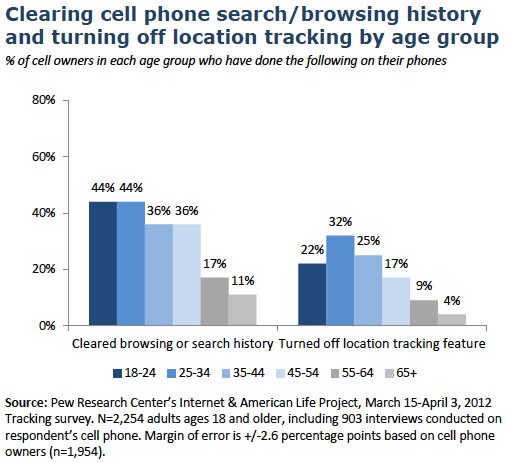
In addition to age and smartphone ownership, cell phone privacy behaviors vary by gender and parental status. Specifically, male cell owners are more likely than women to clear the search and browsing history on their phones (37% of men do this, compared with 28% of women), and parents are more likely than non-parents to clear their search or browsing history (39% vs. 29%) as well as to turn off the location tracking feature on their phones (25% vs. 16%).
In each of these instances (age, parental status, and gender) these behavioral differences persist even when we control for differences in smartphone ownership between these groups. By contrast, for other demographic groups, differences are largely the result of varying levels of smartphone ownership. For instance, college-educated cell owners are more likely to clear their browsing histories and turn off location tracking than those with a high school education, but these differences disappear once we account for higher levels of smartphone ownership among college graduates.
Nearly one third of cell owners have experienced a lost or stolen phone, while one in ten have had someone access their phone in a way that they felt invaded their privacy
Even as cell owners take steps to limit the mobile data that can be accessed by apps makers, advertisers, and mobile operators, cell phones can still physically fall into the wrong hands. Indeed, some 31% of cell owners have had their cell phone lost or stolen, and 12% have experienced a situation in which another person has accessed the contents of their phone in a way that made them feel that their privacy had been invaded.
Interestingly, smartphones are no more likely to be lost or stolen than more basic devices (some 33% of smartphone owners have experienced this, compared with 29% of other cell owners) although these advanced mobile devices do have the potential to offer a more target-rich environment for privacy invasion. Some 15% of smartphone owners say that someone has accessed their phone in a way that made them feel their privacy was invaded, nearly double the 8% of basic phone owners who say this has ever happened to them.
Both of these aspects of mobile privacy also exhibit significant variation based on age. The youngest cell owners (those ages 18-24) are especially likely to have experienced a lost or stolen phone—nearly half (45%) have had this happen to them at some point—although this behavior is relatively common across a range of age cohorts, as one in five cell owners age 65 and up (20%) have experienced the loss or theft of a mobile device. On the other hand, younger users are much more likely to say that personal data on their phone has been accessed by another person in an inappropriate way. Fully one-quarter of cell owners ages 18-24, and 18% of those ages 25-34, say that someone has accessed their phone in a way that made them feel that their privacy had been invaded. By contrast, just 2% of cell owners ages 65 and older have encountered this situation.
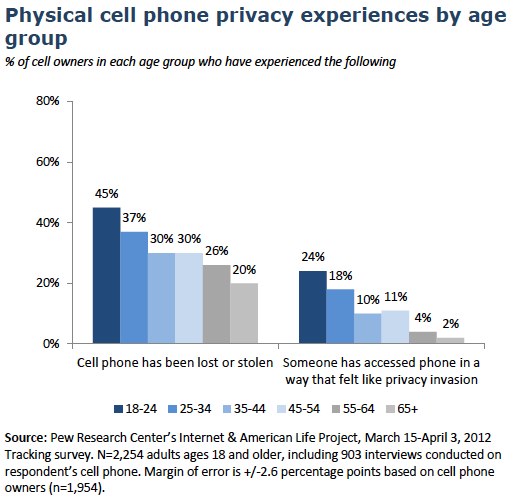
Outside of age, most cell owners are equally likely to experience a lost or stolen phone—although there are some differences around race/ethnicity and community type. Some 44% of African American cell owners say that their phone has been lost or stolen (compared with 28% of whites), while 36% of urban-dwelling cell owners have experienced this (compared with 29% of suburban and 26% of rural residents). When it comes to whether someone has had their phone accessed in a way that made them feel their privacy was violated, age and smartphone ownership are the primary sources of variation: other demographic differences on this issue are relatively modest.
In terms of phone type, Blackberry owners are more likely than other smartphone owners to say that their phone has been lost or stolen—some 45% of Blackberry users say this has happened to them, compared with 30% of iPhone owners and 36% of Android owners. But just 4% of Blackberry users say that someone else has accessed their phone in a way that invaded their privacy, a figure that is substantially lower than the 16% of iPhone owners and 17% of Android owners who have experienced this.
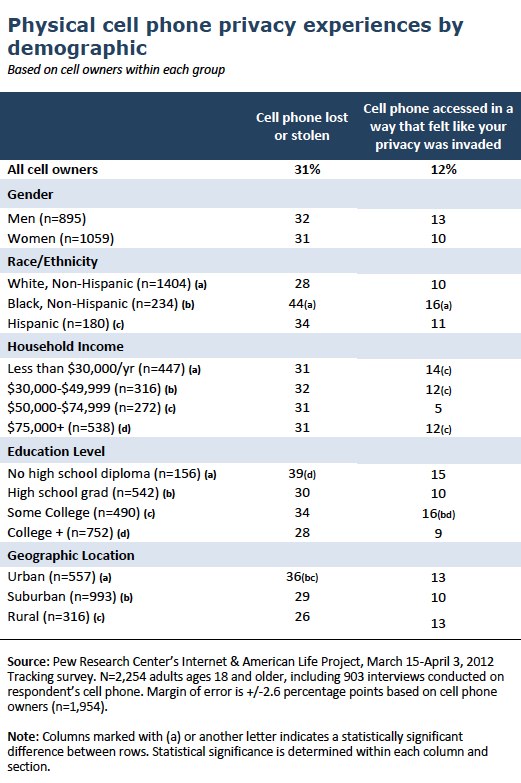
Fewer than half of all cell owners—but a majority of smartphone users—back up the contents of their phone
Even cell owners who take precautions run the risk of a lost, stolen or broken phone that takes files, photos or other personal data with it. And yet, most cell phone owners do not back up the data they have stored on their phones. Some 41% of cell owners say that they back up the photos, contacts or other files on their phone so that they have a copy in case their phone is lost, stolen or otherwise compromised—11% do so “frequently,” 9% do so “occasionally,” and 21% do so “once in a while.” Not surprisingly, smartphone owners are much more likely to back up their phones than are owners of more basic devices. Some 59% of smartphone owners back up their phones at least every once in a while (although this means that 39% of smartphone owners never back up the contents of their phone).
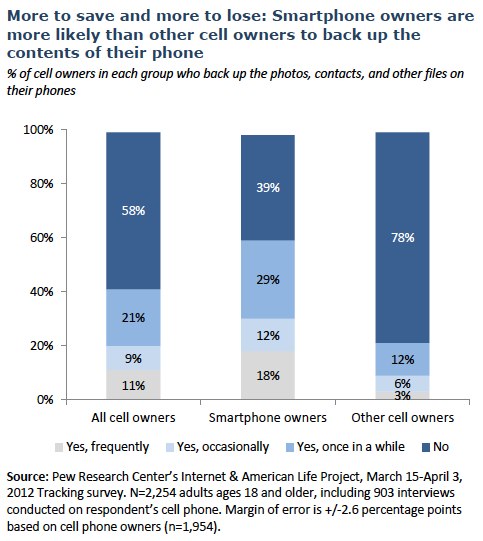
Despite the fact that backing up one’s phone is typically conducted as a safeguard in the event that the phone is lost or stolen, cell owners who have actually experienced a lost or stolen phone are no more likely than average to back up the contents of their phone. Among cell owners whose phones have been lost or stolen in the past, 44% say that they back up their phone at least every once in a while—this is nearly identical to the 41% of all cell owners who do backups, and to the 40% of those who have never had a lost or stolen phone who do so.
By contrast, individuals who say that another person has accessed the contents of their phone without their permission are much more likely than average to conduct regular backups. Some 57% of cell owners whose mobile data has been compromised in this way say that they back up the contents of their phone, compared with 39% of those who have not experienced a similar situation.
In terms of demographic differences, backing up one’s phone’s data goes hand-in-hand with smartphone ownership. Groups with relatively high levels of smartphone ownership (those under 50, the college-educated, those with a household income of $50,000 or more per year) are also the ones that are most likely to say that they back up the contents of their phone.
